What Are the Best Dogs for Hunting Deer?
Discover the best dogs for hunting deer. From tracking abilities to endurance and loyalty, find out which breeds excel and why they're perfect hunting companions.
HUNTING
As an Amazon Associate, I earn from qualifying purchases. This means I may earn a commission if you click on an affiliate link and make a purchase, at no extra cost to you.
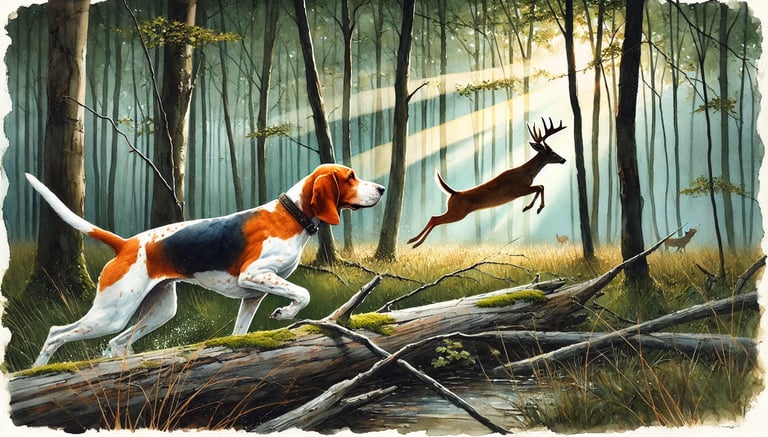

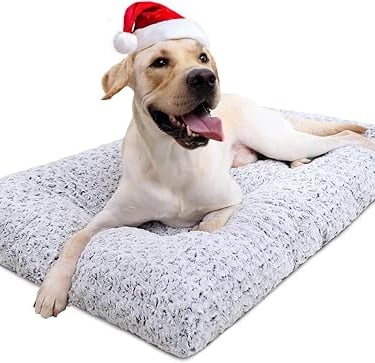

KSIIA Washable Dog Bed Deluxe Plush Dog Crate Beds Comfy Kennel Pad Anti-Slip Pet Sleeping Mat for Large, Jumbo, Medium, Small Dogs Breeds, 35" x 23", Gray
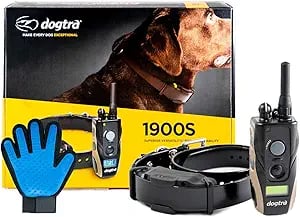

Dogtra 1900S Dog Training Collar with Remote -3/4 Mile Range Dog Locator - Includes Extreme Consumer Products Soft Silicone Pet Grooming Glove
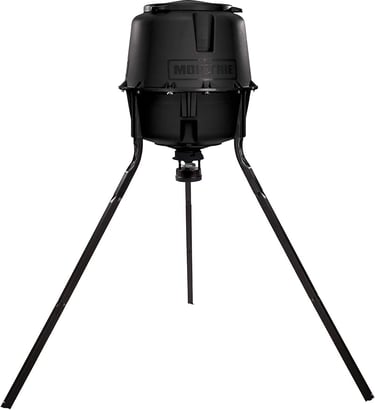

Moultrie 30-Gallon Deer Feeder Tripod, Choose Model
Selecting the right breed involves understanding the traits that make a dog ideal for deer hunting and matching those traits to your hunting needs. In this comprehensive guide, we’ll explore the top breeds, what makes them exceptional, and how to choose and train your ideal hunting companion.
What Makes a Dog Ideal for Deer Hunting?
Not all dogs are suited for deer hunting. The best hunting dogs possess a combination of specific traits that allow them to excel in this demanding activity. Below are the key qualities to consider:
1. Tracking Abilities
A strong sense of smell is crucial for tracking deer over long distances or locating a wounded animal. Hunting dogs should be able to pick up on scent trails, even faint ones, and stay focused on the task.
2. Endurance
Deer hunting often involves long chases across varied terrains. A dog with high stamina can sustain energy levels throughout the hunt, ensuring a productive day in the field.
3. Trainability and Compatibility
Hunting dogs must be intelligent, eager to learn, and compatible with their handler’s style. They need to respond to commands, stay calm under pressure, and work efficiently with other dogs and hunters.
4. Adaptability to Terrain
Whether you’re navigating dense forests, open fields, or rocky landscapes, a hunting dog should be agile and comfortable in diverse environments.
5. Ethical and Humane Practices
It’s essential for hunting dogs to contribute to ethical hunting practices. Their role should minimize unnecessary suffering, ensuring that wounded deer are tracked and recovered promptly.
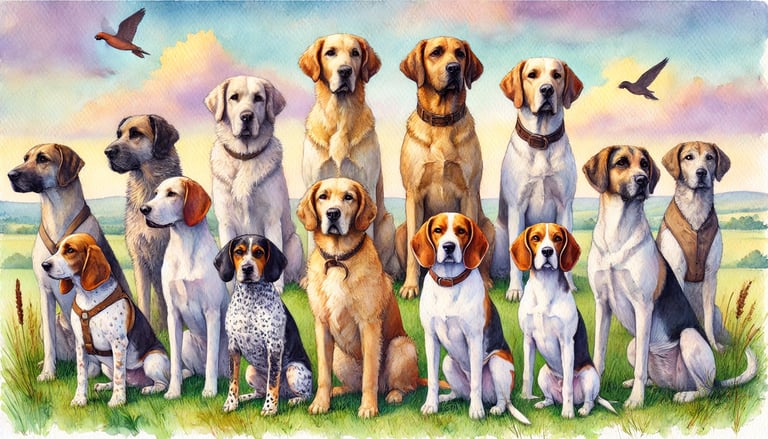

Top Breeds for Hunting Deer
Each breed has unique strengths that make it ideal for specific hunting scenarios. Let’s dive into the best options and what they bring to the table.
1. Bloodhound: The Master of Scent
Bloodhounds are legendary for their ability to track cold scent trails, even days old. They are the top choice for recovering wounded deer, making them invaluable in ensuring no animal goes unrecovered.
Strengths: Exceptional scenting ability, calm demeanor, and persistence.
Best Use: Tracking wounded deer over long distances.
2. American Foxhound: The Endurance Specialist
Originally bred for fox hunting, American Foxhounds are built for speed, stamina, and relentless pursuit. They are ideal for deer drives, where their ability to keep prey moving is unmatched.
Strengths: Incredible stamina, sharp scent-tracking skills, and agility.
Best Use: Long-distance chases and open terrain hunting.
3. Beagle: Small but Mighty
Despite their compact size, Beagles are fierce trackers with an impressive sense of smell. Their agility and ability to navigate dense woods make them effective in challenging terrains.
Strengths: Compact size, excellent scenting ability, and maneuverability.
Best Use: Hunting in wooded or rugged areas.
4. Walker Coonhound: The Versatile Tracker
Originally bred for raccoon hunting, Walker Coonhounds have proven their value in deer hunting. Their loud, distinctive baying helps hunters locate them during the chase.
Strengths: Versatility, endurance, and vocal tracking.
Best Use: Varied terrains and scenarios requiring audible tracking.
5. Plott Hound: The Fearless Pursuer
Plott Hounds, native to North Carolina, are tenacious hunters known for their courage and determination. They thrive in challenging terrains and can pursue deer tirelessly.
Strengths: Strong stamina, keen nose, and tenacity.
Best Use: Rugged terrains and long-distance hunts.
6. German Shorthaired Pointer: The All-Rounder
While primarily associated with bird hunting, German Shorthaired Pointers are versatile and excel in deer hunting with proper training. They combine endurance and scenting ability.
Strengths: Versatility, stamina, and adaptability.
Best Use: Tracking and hunting in various terrains.
7. Labrador Retriever: The Eager Trainee
Known for their intelligence and trainability, Labradors can be adapted for deer tracking despite being more commonly associated with bird hunting. Their loyalty and eagerness to please make them reliable partners.
Strengths: Intelligence, adaptability, and trainability.
Best Use: Tracking wounded deer in controlled environments.
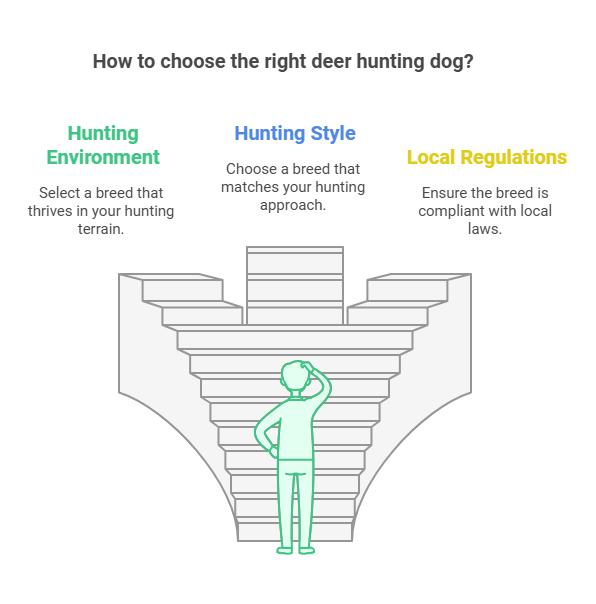

Factors to Consider When Choosing a Deer Hunting Dog
Choosing the right breed depends on your specific hunting needs. Here’s what to consider:
1. Hunting Environment
Different breeds thrive in different terrains. For example, Beagles and Plott Hounds excel in dense forests, while American Foxhounds are ideal for open fields.
2. Hunting Style
Your style of hunting—whether it’s driving deer, tracking wounded game, or ambushing—should guide your choice of breed.
3. Local Regulations
Familiarize yourself with local laws regarding the use of dogs in deer hunting, as regulations can vary by region.
4. Personal Preferences
Consider factors such as the size, temperament, and maintenance needs of the breed to ensure compatibility with your lifestyle.
The Importance of Training
A well-trained dog is the cornerstone of successful deer hunting. Proper training ensures your dog performs efficiently while maintaining safety and ethical standards.
1. Basic Obedience Training
Start with fundamental commands like “sit,” “stay,” and “come.” Obedience forms the foundation for more advanced hunting skills.
2. Scent Training
Introduce your dog to deer scents using commercially available scent products or real deer hide and blood. Gradually increase the complexity of scent trails to build their confidence.
3. Field Training
Expose your dog to hunting scenarios in controlled environments. Simulate hunts to familiarize them with the sights, sounds, and smells of the field.
4. Positive Reinforcement
Reward good behavior with treats, praise, and playtime. Consistency and patience are key to effective training.
Ethical Considerations in Hunting with Dogs
Hunting with dogs comes with ethical responsibilities. Here are some best practices:
Ensure Dog Safety: Use GPS collars and provide adequate water and rest breaks during the hunt.
Minimize Animal Suffering: Train your dog to track and recover wounded deer promptly to avoid prolonged suffering.
Follow Regulations: Adhere to local hunting laws to ensure ethical and legal practices.
FAQ
Q: What is the best breed for tracking wounded deer?
A: Bloodhounds are the top choice due to their unmatched scent-trailing abilities.
Q: Can small breeds like Beagles handle deer hunting?
A: Yes, their compact size is an advantage in wooded or rugged terrains.
Q: Are Labradors good for deer hunting?
A: While primarily bird dogs, Labradors can be trained for deer tracking with great success.
Q: Do deer hunting dogs make good pets?
A: Many hunting breeds are friendly and adaptable, making them excellent family pets when given proper exercise and training.
Q: How long does it take to train a deer hunting dog?
A: Training can take several months, depending on the dog’s age, breed, and prior experience.
Q: Can I use multiple breeds during a hunt?
A: Yes, many hunters use mixed packs to leverage the strengths of different breeds, such as using Bloodhounds for tracking and Foxhounds for driving.
With the right dog by your side, deer hunting becomes not only more efficient but also a rewarding partnership between hunter and hound. By selecting the right breed, investing in proper training, and adhering to ethical practices, you can ensure a successful and responsible hunting experience.
If you like this article, you'll love these,
